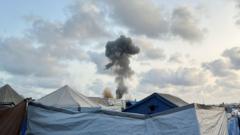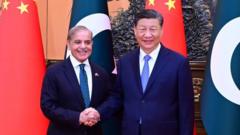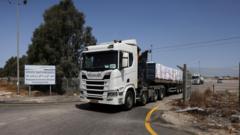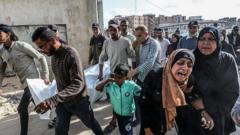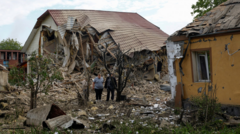The international community is increasingly demanding action as the humanitarian crisis unfolds in Gaza, following the recent escalation of violence after the breakdown of ceasefire efforts.
Escalation of Tension: Calls for Ceasefire Grow Amid Israel's Gaza Offensive
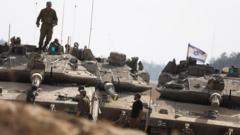
Escalation of Tension: Calls for Ceasefire Grow Amid Israel's Gaza Offensive
Leaders from the UK, France, and Canada urge Israel to halt military operations as civilian suffering escalates in Gaza.
In response to the backdrop of violence that erupted after Hamas's attacks on October 7, Israel's military actions have come under severe criticism from major allies. The leaders of France, the UK, and Canada have collectively condemned Israel's offensive in Gaza and are demanding an immediate ceasefire. The tensions have heightened as a high number of civilians have fallen victim to the ongoing military operations, prompting these governments to denounce the level of human suffering as "intolerable."
Israeli Prime Minister Benjamin Netanyahu insists that the military campaign is aimed at dismantling Hamas, yet the trio of allied nations argues that the escalation is disproportionate and unacceptable. Their joint statement emphasizes the need for humanitarian assistance and calls for a halt to military actions, stressing that the measures currently in place are insufficient to address the dire situation in Gaza.
The pressure on Israel has intensified, with European leaders explicitly warning of the possibility of "concrete steps" against Israel if the current operations do not cease and the blockade on humanitarian aid is not lifted. The growing frustration among these allies has deepened, culminating in serious discussions about possible sanctions or even recognizing Palestine as an independent state.
Netanyahu's decision to allow some aid to enter Gaza has been met with criticism from his hardline coalition partners, expressing fears that even limited humanitarian efforts could bolster Hamas, exacerbating the ongoing crisis. As the Israeli military pushes forward with its operations, the toll of the conflict continues to rise, garnering ire not just from opposition groups but increasingly from key international partners.
In recent weeks, the humanitarian situation has been exacerbated, with reports of the tragic deaths of first responders and civilians. Incidents like the killing of aid workers have spotlighted the reality of the conflict and spurred calls for accountability. The growing discontent among the Israeli government's traditional allies suggests a pivotal moment in international relations concerning Israel and its military actions, as calls for justice and peace echo louder in global discussions.
Israeli Prime Minister Benjamin Netanyahu insists that the military campaign is aimed at dismantling Hamas, yet the trio of allied nations argues that the escalation is disproportionate and unacceptable. Their joint statement emphasizes the need for humanitarian assistance and calls for a halt to military actions, stressing that the measures currently in place are insufficient to address the dire situation in Gaza.
The pressure on Israel has intensified, with European leaders explicitly warning of the possibility of "concrete steps" against Israel if the current operations do not cease and the blockade on humanitarian aid is not lifted. The growing frustration among these allies has deepened, culminating in serious discussions about possible sanctions or even recognizing Palestine as an independent state.
Netanyahu's decision to allow some aid to enter Gaza has been met with criticism from his hardline coalition partners, expressing fears that even limited humanitarian efforts could bolster Hamas, exacerbating the ongoing crisis. As the Israeli military pushes forward with its operations, the toll of the conflict continues to rise, garnering ire not just from opposition groups but increasingly from key international partners.
In recent weeks, the humanitarian situation has been exacerbated, with reports of the tragic deaths of first responders and civilians. Incidents like the killing of aid workers have spotlighted the reality of the conflict and spurred calls for accountability. The growing discontent among the Israeli government's traditional allies suggests a pivotal moment in international relations concerning Israel and its military actions, as calls for justice and peace echo louder in global discussions.



